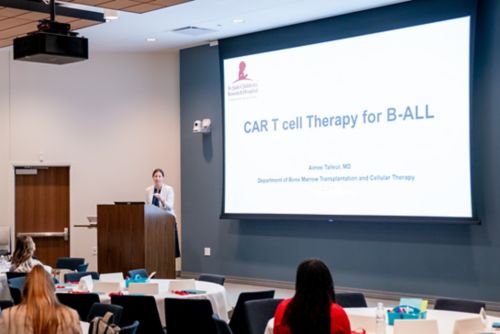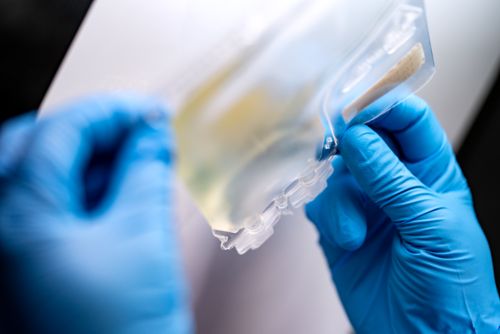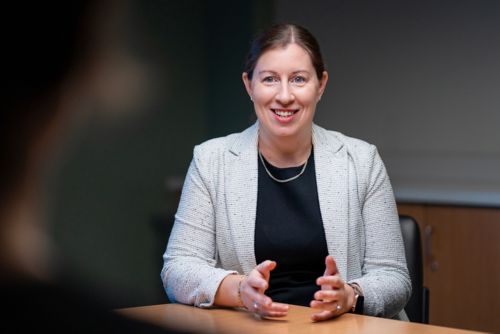St. Jude Family of Websites
Explore our cutting edge research, world-class patient care, career opportunities and more.
St. Jude Children's Research Hospital Home

- Fundraising
St. Jude Family of Websites
Explore our cutting edge research, world-class patient care, career opportunities and more.
St. Jude Children's Research Hospital Home

- Fundraising
Aimee C. Talleur, MD
Advancing therapeutic approaches for high-risk pediatric hematologic and malignant diseases and understanding treatment-related impact on survivors
Overview
Chimeric antigen receptor (CAR) T-cell therapy is a targeted immunotherapeutic approach used in pediatric patients with certain types of relapsed or refractory cancers. While this targeted therapy has improved the long-term survival rate for some patients, we continue to develop and optimize next-generation CAR T cells to further increase survival rates, decrease side effects and maintain long-term remission in patients. My work focuses on understanding the therapeutic profile of CAR therapies, including the late effects of CAR T-cell therapy on survivors of childhood cancers.
Talleur Research Summary
To increase the efficacy of CAR T-cell therapy for patients and maintain remission, we focus on several key aspects of therapy, leveraging different therapeutic angles to increase persistence of engineered CAR T cells. One approach, called allogeneic CAR T-cell therapy, uses donor-derived T cells instead of a patient’s own T cells. We postulate that this approach will increase efficacy as donor T cells tend to be in a healthier cellular state compared to a patient’s own T cells. Furthermore, allogeneic CAR T-cell therapy is more inclusive as it provides access to subsets of patients, such as infants, that have previously been excluded from CAR T-cell therapy due to the inability to collect their own T cells.

Another avenue of exploration is optimizing the lymphodepletion included in CAR T-cell treatment. Lymphodepletion reduces immune cell competition, allowing the engineered CAR T cells to expand and persist for longer. Fludarabine (FLU), a commonly used chemotherapy for lymphodepletion, is an antimetabolite that inhibits DNA synthesis and depletes existing immune cells. Data show that there is a correlation with FLU exposure and relapse risk and survival in children with B-cell acute lymphoblastic leukemia (B-ALL) treated with CD19-targeting CAR T-cell therapy. The amount of drug these children are exposed to varies with drug metabolism, such that younger children metabolize FLU more rapidly than older children. This means that giving the same dose of FLU to all children could lead to underexposure in some patients, and therefore an increased risk of relapse. To investigate this further, we performed pharmacokinetic modeling studies, which supported the use of age-adjusted FLU dosage regimens to maintain effectiveness and improve outcomes in children treated with CAR T-cell therapy.
We are also reimagining the physical engineering of CARs to improve outcomes for children with B-ALL. CAR T-cell therapy can fail if malignant cells undergo antigen escape. This phenomenon occurs when cancerous cells evolve to lose the antigen which the CARs are engineered to target, thereby rendering the treatment ineffective. To counteract this, we are evaluating a novel dual antigen-targeting CAR which targets both CD19 and CD22, with the goal of lessening the likelihood of antigen escape.
Understanding the impact of treatment
While CAR T-cell therapy has improved survival rates in many pediatric patients, the very nature of its mechanism of action can provoke hyperinflammation and endothelial damage. Ideally, CARs attached to T cells target tumor-specific antigens, but this is not always the case as many of these targets, such as CD19, are also present on normal T cells. When CAR T cells engage with their intended target, it can provoke hyperinflammatory responses such as cytokine release syndrome (CRS), immune effector cell-associated neurotoxicity syndrome (ICANS) and hemophagocytic lymphohistiocytosis (HLH)-like toxicities. These conditions are often treatable, but early intervention is best. For this reason, I am interested in developing predictive tools to identify patients who are at a higher risk for developing these complications.
By evaluating Endothelial Activation and Stress Index (EASIX) and modified EASIX scores before, during and after CAR T-cell infusion, we determined that these scores accurately predicted a child’s risk of developing adverse outcomes. EASIX scores are generated from a combination of plasma biomarker values which give a prognostic score that is proportional to one’s risk of having a worse prognosis and developing adverse effects. This predictive tool allows clinicians to implement early interventions to high-risk patients and improve clinical outcomes.
CAR T-cell therapy and late effects
Improvements in immunotherapies have increased the survival rates of patients with many types of blood cancers, meaning there are more survivors of pediatric cancers than ever before. We are interested in understanding the long-term impact of CAR T-cell therapy on children treated with this novel therapy. Taking a comprehensive and standardized approach, we will be able to understand how CAR T-cell therapy affects our patients from infusion and beyond.

Mentorship
In addition to my clinical and academic interests, I am also passionate about mentoring the next generation of clinician scientists. I serve as the fellowship director for the Bone Marrow Transplantation & Cellular Therapy Fellowship Program and support the Pediatric Hematology-Oncology Fellowship Program as the representative for the Department of Bone Marrow Transplantation & Cellular Therapy.
Selected Publications
About Aimee C. Talleur
Dr. Talleur is a pediatric oncologist who earned her medical degree from State University of New York Medical University in Syracuse, NY. She then completed a residency in pediatrics at Children’s National Medical Center in Washington DC. From here, Dr. Talleur completed three fellowships at St. Jude Children’s Research Hospital: a fellowship in pediatric hematology-oncology, a one-year fellowship in the physician scientist training program and a clinical fellowship in the Department of Bone Marrow Transplantation & Cellular Therapy, where she is currently an Associate Member. Dr. Talleur is a clinician scientist interested in developing and optimizing CAR T-cell therapies for children with B-ALL. She is also interested in understanding the long-term impact of CAR T-cell therapy on survivors of childhood cancers.

Contact us
Aimee C. Talleur, MD
Associate Member
Department of Bone Marrow Transplantation and Cellular Therapy
MS 1130, Room I3309
St. Jude Children's Research Hospital

Memphis, TN, 38105-3678 USA GET DIRECTIONS